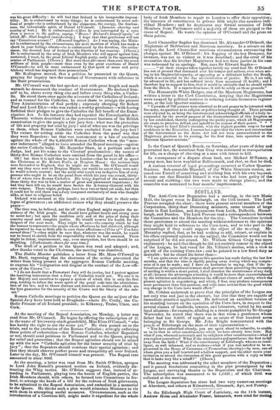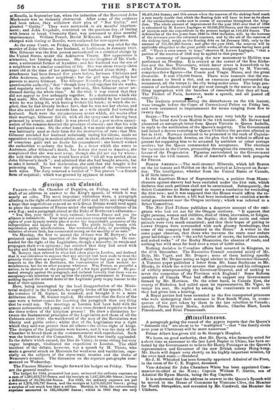SCOTLAND.
The Anti-Corn-law Deputation had a meeting, in the new Musk Hall, the largest room in Edinburgh, on the 11th instant. The Lord Provost occupied the chair : there were present several members of the Corporation, thirty-four Dissentiag ministers, some tenants of large farms in East Lothian, and deputations from Leith, Dalkeith, Mussel- burgh, and Dundee. The Lord Provost read a correspondence between the Committee and the Members for the city. The Committee invited those gentlemen to attend the meeting without reference to the opinions they might hold in reference to the Corn-laws, and to take part in the proceedings if they could support the object of the meeting. Mr. Macaulay replied, that, as he had nothing to add, retract, or explain in his often-expressed opinion on the subject, the Committee would not be surprised if he did not attend. Mr. William Gibson Craig was more explanatory : he said that though he did not entirely concur in the object of the League, he had voted for Mr. Villiers's motion, with a view to get rid of the existing Corn-law ; and he pointed to a low fixed duty as desirable : but he closed his letter thus-
" I am quite aware of the progress this question has made during the last few months, and that the time is rapidly passing away during which any compro- mise of it can be made ; and I have no hesitation in saying, that if the in- fatuation of the agricultural interest shall prevent them perceiving the necessity of settling it within a short period, I shall abandon the maintenance of any duty at all; because the advantages attending it would be more than counterbalanced by the irritation and disunion between the different classes of society which the present agitation is engendering, and which, I fear, may produce consequences more permanent than this question, and evils more serious than the good which any change in the Corn-laws would effect."
Mr. Cobden undertook to prove that the principles of the League are not only true and just in the abstract, but also that they are capable of immediate practical application. He delivered an excellent version of his standing lecture on the operation of the Corn-laws, in respect to the several classes of landlords, tenants, and labourers, varied by his usual local allusions : for example, alluding to a recent pamphlet by Sir George Warrender, he stated that there was in that room a gentleman whose father had lost 9,000/. of capital on an estate of four hundred acres belonging to Sir George. Mr. John Bright remonstrated with the people of Edinburgh on the state of their representation-
" You have subscribed already, you are again about to subscribe, to enable us to do that in other constituencies which we have already done here. But what if you, whosend us to teach and to enlighten other constituencies—what if younegleet yourselves? What if the missionaries and apostlesare the first to fall away from the faith ? What if the constituency of Edinburgh, who are so intel- ligent, so well informed, and so zealous—what if you rest satisfied to be re- presented in the House of Commons —(Tremendous cheering).-.by men, one of whom gives you a half-hearted and a hollow support, and the other meets your invitation to attend the discussion of this great question with a reply so heist that it looks very like a rebuff?" (Cheers.)
The meeting was addressed by the other members of the Deputation ; and it passed resolutions concurring in the plan promulgated by the League, and conveying thanks to the Deputation and the Chairman. The subscription was announced to be 1,1421.; of which 2601. was collected at the meeting.
The League deputation has since had two very numerous meetings at Aberdeen, and others at Kilmarnock, Greenock, Ayr, and Paisley.
In the Edinburgh High Court of Justiciary, on the 11th instant, Andrew Holm and Alexander Fraser, labourers, were tried for rioting at Resolis, in September last, when the induction of the Reverend John Mackenzie was so violently obstructed. After some of the evidence had been taken, they withdrew their plea of " Not Guilty," and pleaded " Guilty." They were sentenced to six months' imprison- ment ; and John Urquhart, convicted on the previous day, of rioting with intent to break Cromarty Gaol, was sentenced to nine months' imprisonment. William Fraser, David 1WICenzie, and Elspeth Aird, charged with rioting at Resolis, were outlawed for non-appearance.
At the same Court, on Friday, Christina Gilmour was tried for the murder of John Gilmour, her husband, at Inchiunan, in January 1843. Mrs. Gilmour was the first person surrendered on a criminal charge by the United States, under the Ashburton Treaty. Her appearance is attractive, her bearing decorous. She was the daughter of Mr. Coch- rane, a substantial farmer of Ayrshire ; and her husband was the son of a neighbour in a similar condition of life. She was about twenty-three years old at the time of her marriage ; her husband about thirty. An attachment had been formed five years before, between Christina and John Anderson, another neighbour ; but the girl was obliged by her parents to marry Gilmour. The Glasgow Saturday Post says, on "un- questionable authority," that "though they lived together for six weeks, and regularly retired to the same bedroom, Mrs. Gilmour never un- dressed during the whole time." At the trial, it was stated that they did not appear to live unhappily together. In a declaration which she bad made, Mrs. Gilmour said that she was upbraided by her husband, while he was lying ill, with having broken his heart ; to which she re- plied, that he bad already broken hers, that he was not her choice, and that she could never feel towards him as a wife should feel towards a husband. Such were the circumstances under which, six weeks after their marriage, Gilmour fell ill, with all the symptoms of having been poisoned by arsenic, and died : it was proved that a post mortem exami- nation of his remains detected the presence of arsenic ; and that his wife had purchased some. On the other hand, it was made clear that arsenic was habitually used at their farm for the destruction of rats ; that Mrs. Gilmour attended her husband sedulously during his illness, made no opposition to calling in medical advice, and, in short, showed no evidences of conscious guilt and no desire for concealment she herself wished the authorities to unbnry the body. In a letter which she wrote to Anderson, after Gilmour's death, but before she went to America, she complained that she was sent away, though she did not say by whom : She said that otherwise she would have staid "till all was settled about John Gilmour's death " ; and admitted that she had bought arsenic, but to take it herself. In her declaration, she said that she bought it for poisoning rats. These were the principal points of the evidence on both sides. The Jury returned a verdict of " Not proven "—a Scotch form of acquittal; which was greeted by applause in court.



























 Previous page
Previous page